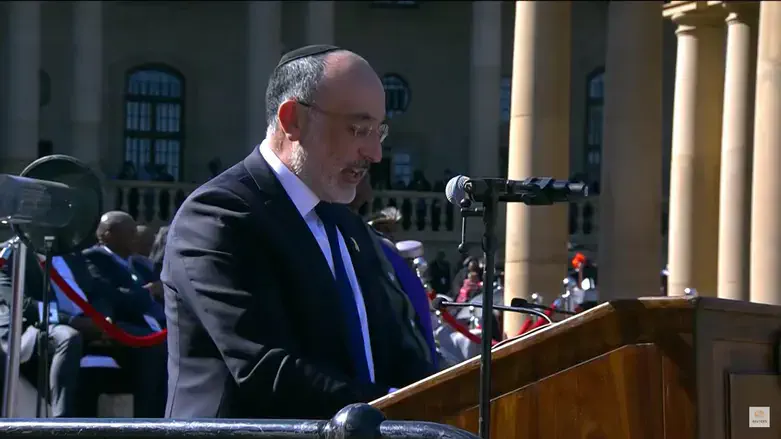
At the South African presidential inauguration in Pretoria on Wednesday, amidst a colorful crowd of dignitaries and foreign heads of state, one man stood out.
Chief Rabbi Dr Warren Goldstein – despite his relentless and outspoken criticism of the ANC government’s anti-Israel policies and rhetoric in the months since October 7th – had been among just five religious leaders representing the country’s major faith communities invited to deliver a prayer to mark the occasion.
Wearing a prominent yellow ribbon, he proceeded to fill the prayer with thinly veiled references to Israel, mentioning a number of Biblical verses reinforcing the historic Jewish connection to the holy land.
There were references to the “children of Israel crossing the Jordan River to enter the promised land more than 3300 years ago”; to God’s promise to the Jewish people to “dwell upon the land” given to Abraham, Isaac, and Jacob; to the ancient Temple in Jerusalem, “with the Western Wall the only remnant of its once glorious precincts”; and to “returning the captives of Zion” – a clear allusion to the hostages held by Hamas.
The chief rabbi also issued an ominous warning in the context of the previous government’s anti-Israel policies, citing God’s promise to Abraham to “bless those who bless you, and those who curse you, will I curse.”
“I proudly wore a yellow ribbon and mentioned these Torah verses,” says Goldstein, “to remind my fellow citizens – including the president and all who were there – of the Jewish people’s unbreakable, inviolable connection to Israel and our eternal capital of Jerusalem, and that no civilized nation can rest until evil is defeated and the hostages are freed.”
Reaction shots to the prayer on the national broadcast showed President Cyril Ramaphosa and Julius Malema, leader of the far-left Economic Freedom Party – both of whom campaigned on a hateful anti-Israel platform – with bemused expressions.
Ramaphosa in particular had good reason to be nonplussed. A bizarre foreign policy strategy, centered on bringing the Jewish State before the ICJ on charges of genocide and displaying solidarity with Hamas and Iran, has not translated into increased support. Quite the opposite, in fact, with the ANC losing its majority for the time since the advent of democracy 30 years ago, gaining just over 40% of the national vote.
Nowhere was that more apparent than in the Western Cape province, where the ANC’s anti-Israel campaign was most intense, and where the majority of the country’s Muslim population reside. The centrist Democratic Alliance (DA) solidified its hold on the province, while the most pro-Israel party on the ballot, the Patriotic Alliance, grew by the exact percentage the ANC declined – 8%.
“The message from the voters is that they don’t want to be distracted by anti-Israel policies or the personal agenda of [Foreign Minister] Naledi Pandor,” says Goldstein, “they want their lives to improve.”
Nevertheless, to their credit, the ANC accepted the election results with humility and proceeded to build an extremely promising coalition with their former political adversaries, the DA.
“Cynics who claimed that our democracy would not survive an election that dethroned the ruling party were proved wrong,” says Goldstein. “Things did not fall apart. The constitution held. Democracy held. The center holds – and now we have a government of national unity with the power and promise to usher in an era of national renewal and healing that 60 million South Africans so desperately need.”
And yet, despite the promise of a new dawn, SA’s chief rabbi said he felt conflicted after receiving the invitation to deliver the inauguration prayer.
“Initially, I wasn’t sure how to respond. On the one hand, South Africa’s new government of national unity represents the best prospects for the country’s success: economic development, political stability, and poverty alleviation. On the other hand, the government includes a president and a ruling party who remain unrepentant antagonists of Israel.”
Eventually, he decided to “embrace the contradiction” – to “will the government to succeed, and pray for its success – while resolving to vocally, vehemently oppose the government’s stance on Israel.”
Beyond the presidential inauguration, these experiences have helped Goldstein formulate a paradigm for how the South African Jewish community should engage with the new government.
“On the one hand, we should support the government of national unity’s efforts to uplift the lives of 60 million South Africans, and do so with a full heart. This of course includes praying for its success, which is why I have amended the prayer for South Africa recited in shuls every Shabbat morning to include mention of our new government.
“At the same time, should this government continue the vicious anti-Israel policies of its predecessor, we must continue to oppose it fiercely. As I have in the months since October 7, I will fight them locally and globally, strengthening parallel diplomatic channels to Israel, lobbying Jewish and political leaders in Washington, vehemently opposing the South African government’s relations with Iran, the largest state sponsor of global terror.
“I will continue to raise the issues of terror funding, the Jihad against Africa’s Christians, the dire threat of a nuclear Iran. And together, we must all continue to speak out for the justice of Israel’s cause, and for the release of our hostages.”
